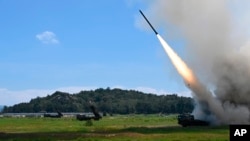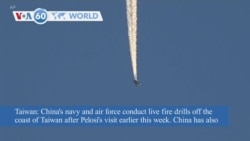Xiaoliuqiu is the kind of tiny laid-back tropical island no visitor wants to leave. Soul-healing scenery, scrumptious seafood, clear waters for cozying up with green sea turtles and these days, Chinese naval vessels.
Controlled by Taiwan, the isle is a swimmable 9.5 kilometers from the seas where China is conducting live-fire exercises in response to U.S. House Speaker Nancy Pelosi's visit this week visit to the self-governing island. China, which views Taiwan as a breakaway province, responded fiercely to Pelosi's latest challenge to Beijing's record on human rights and democracy.
Yet as a tense world watches these latitudes, on the island, "It seems everything's pretty much normal in terms of the local attitude," said John Eastwood, an American lawyer who was vacationing on the island close to the Chinese mainland, on Thursday.
According to Taiwan's Defense Ministry, China on Thursday fired "multiple Dongfeng series ballistic missiles." The ministry went on to describe the launches as "irrational actions that undermine regional peace."
Meanwhile, back on Xiaoliuqiu: "Everyone seems to have a pretty good attitude," Eastwood told VOA Mandarin Thursday via Teams video.
Eastwood, who has lived and worked in Taiwan for 22 years, said Xiaoliuqiu restaurants are open and people are kayaking, scuba diving and stand-up paddleboarding.
"All the watersports activities are still going on, and people are behaving like normal," he said.
His hotel faces the waters where China was conducting drills.
On Thursday morning, he spotted only a little fishing boat. But "by noon, which was around the time that China was supposed to start the exercises, we counted about 13 ships that appeared out on the horizon. They appeared to be motionless, which indicated that they would be vessels monitoring or watching what's going on," he said.
On Friday, China's military activated more than 100 planes and more than 10 warships for its largest-ever live-fire drills. State media CGTN quoted Meng Xiangqing, a professor at the National Defense University of the People's Liberation Army, as saying, "The exercises were far more intense and deterrent than ever before."
The drill has forced a number of commercial vessels to reroute. Lloyd's List Intelligence reported Thursday that about 240 merchant ships would have to find alternative routes to their destinations.
China's ballistic missile launches, which the U.S. called an "overreaction," ruffled Xiaoliuqiu's calm.
"People worry there can be a mechanical failure of some sort that results in a warhead landing," Eastwood told VOA Mandarin.
China's retaliatory restrictions on trade are expected to hit Taiwan's fruit and seafood industries.
Despite these measures, Eastwood said most Taiwanese people still supported Pelosi's visit.
"It seems pretty clear that Nancy Pelosi has just got herself about 24 million huge fans," Eastwood said. The U.N. estimated Taiwan's population was at 23,893,751 on July 1, according to the World Population Review.
The Taiwanese people treasure their democracy, Eastwood said. "This is something they earned the hard way at the cost of tens of thousands of lives during the White Terror period in which a large number of people were imprisoned and executed."
The White Terror that began in 1947 was four decades of rule over Taiwan by the Kuomintang, also known as the Chinese Nationalist Party, after it was defeated by the communists in mainland China. Dissidents were arrested, interrogated and executed by Kuomintang intelligence agencies, according to Taiwan's National Human Rights Museum. Estimates of the number of civilians killed in the crackdown range from 2,000 to more than 25,000, according to experts.
Taiwan remained a single-party state until democratic reforms in the 1980s, which led to the first direct presidential election in 1996.
Eastwood hopes for a quick return to normal when, "at Songshan Airport in Taipei, there were flights basically taking off every half hour for a different city in China. People were doing businesses together and productive things together, they were making value together," he said.
"That's a good thing to go to rather than setting up a blockade."









